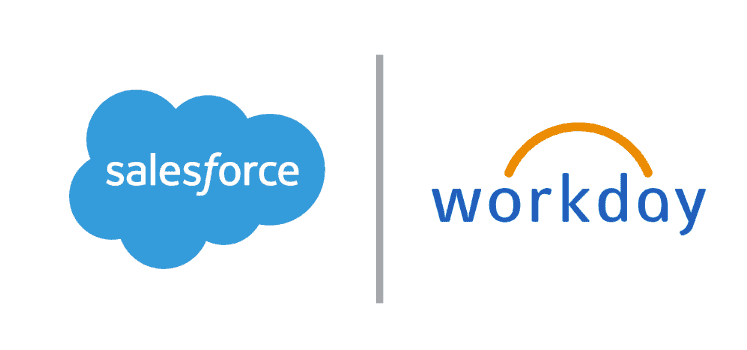
This week Workday and Salesforce announced a major partnership, focused on integrating these two major enterprise systems to get ahead of the increasing demand for integrated AI.
What did they announce? Two big things.
First, the companies are going to integrate their data platforms.
Salesforce holds vast amounts of sales and customer data (leads, opportunities, deals, and customer transactions) and Workday serves as the financial and HR system of record. Conceptually they belong together, but the two companies grew independently. Once this integration is complete, joint customers will be able to see a single view of all this data in one place.
How are they doing this? Rather than forcing customers to build customer integrations with Workday Prism (which is expensive), the vendors are building a connection using the Salesforce Data Cloud APIs. While the details are not announced, this means a company could run reports that combine sales data (proposals, leads, and sales activity) with financial data (contract expiration, accounts receivable, late payments) in a single set of reports and queries.
Today many companies build custom data objects in Salesforce to do this (Salesforce has always had a highly extensible database system), effectively replicating information. This type of integration will “join these companies at the hip,” making it possible for IT teams and managers to run reports and create dashboards that bring these systems together. There are hundreds of use-cases for this deal.
In some ways it’s as if Workday now has it’s own CRM solution, and Salesforce customers have their own integrated ERP. I’m sure there are thousands of overlapping customers, so if this engineering goes well, it really aligns these companies together and creates a competitive force against Oracle, SAP, and others. (I would not imagine Marc Benioff doing this kind of deal with Oracle, and I don’t know if Workday would do this deal with Hubspot, for example.)
The second project is more interesting: integrating the Salesforce and Workday AI agents.
Salesforce Einstein is an AI agent (similar to our Galileo) that lets users interact with their Salesforce system. It also has an extensible toolkit to enable Salesforce customers to add other data and actions to the system (imagine a pricing database or other customer service database). Workday has its own AI agent (the Workday Assistant). Through an AI agent integration, users in either agent can now chat with the other system, and the partnership positions this as a new AI Employee Service Agent.
In other words, a manager could use Einstein to ask questions like “show me the top 10% of all our sales reps for this quarter, include their YTD earnings, tenure, and job level in top to bottom order.” The manager could then say “please sort these people by gender” or “show me the size of their territories” and the system could mix the CRM data from Salesforce with the salary, job level, and other employee data from Workday. Lots of value here.
While Benioff describes this along the lines of “we have the most data for AI now,” I see this as a very pragmatic solution. Companies are busy experimenting with Microsoft Copilot, ServiceNow NowAssist, Galileo, and dozens of other industry AI agents. Each of these systems has been trained and developed to access specific, domain-deep information. This type of “integrated orchestration” lets IT departments start to make more sense of the massive proliferation of bots.
As I wrote about in the article “Here Come The Copilots,” these two companies are partnering to make sure their agents work as a family. Workday Assistant users can ask questions about Salesforce, and Einstein users can ask questions about Workday (financial and HR data).
Market Implications Of This Partnership
There are many competitive implications of this deal. If the companies get this all to work (integrating two chatbots is not a simple task, since each agent is still immature in its own way), one could imagine Salesforce making a play to be “the integration platform for AI agents.” This position in the market, which is Microsoft’s natural space, could give Salesforce a new breath of life as the company struggles for organic growth. Workday, whose agent is still evolving, gets access to the Einstein layer and this may help Workday’s agent move faster.
Competitors that won’t be happy include Microsoft (who has an aggressive program to build AI Agent integrations through the Copilot, which we’re working on ), ServiceNow, which has a customer base larger than Workday and already includes deep integrations with many corporate systems, and SAP, who is well along with a very advanced agent called Joule. One has to wonder if Salesforce would “refuse” to integrate with SAP (who has their own CRM), and possibly drag their feet with Microsoft. Hard to say.
I also sense from the announcement that both companies are hoping to get help from each other. Building AI agents is not a simple task (getting data into them is only a small part of the product, you have to map transactions as well), and I would guess that engineers on both sides will work with each other. Since they clearly call the project an AI Employee Service Agent, I do wonder who owns what.
Whether we like it or not, the new world of AI has created a new “tower of Babel” for HR and IT. Which agent goes to which employee group, and how do we integrate these things together? I know there will be very powerful specialized AI’s like Galileo, Paradox, and many others.
Before these things come together, we’re probably going to have to live with a proliferation of bots for a while. While this deal is significant, my bet is that Microsoft and ServiceNow become most dominant, and I’m sure Marc Benioff and Carl Eschenbach just don’t want to wait and see.
Additional Information
Introducing Galileo™, The World’s First AI-Powered Expert Assistant For HR
Here Come The Copilots!
